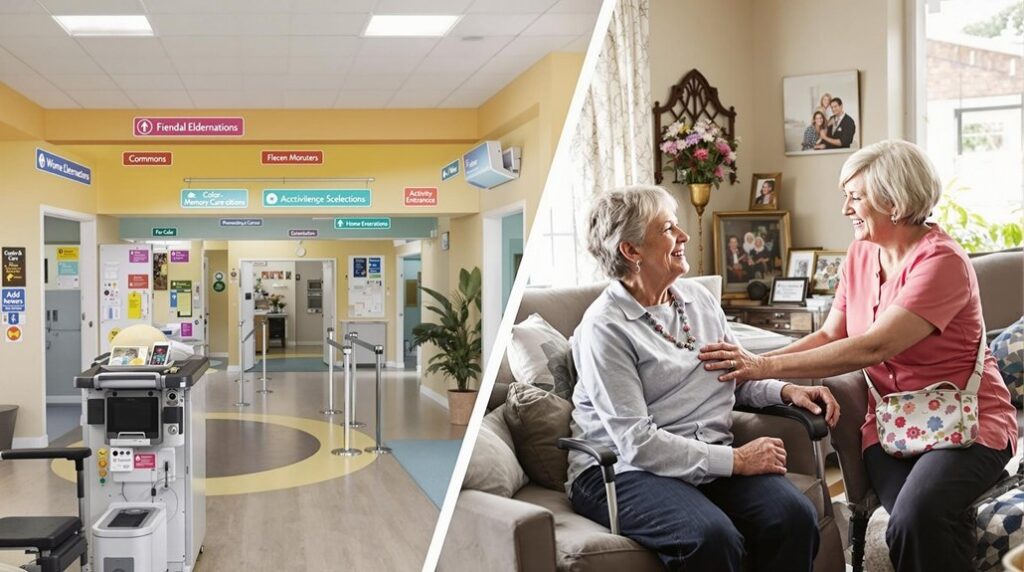Memory care facilities provide specialized environments with 24/7 supervision and secured entrances for seniors with cognitive decline, while home care services bring professional caregivers to your loved one’s residence. You’ll find memory care offers structured activities, built-in safety features, and staff trained specifically in dementia care. Home care gives you more flexibility with schedules and customized one-on-one support. Understanding the complete range of services and costs will help guide your choice.
Understanding Memory Care Facilities: Structure and Services
While many seniors with dementia initially receive care at home, memory care facilities offer a specialized environment designed specifically for those with cognitive decline.
The memory care structure includes secured entrances and exits, color-coded hallways, and clear signage to prevent wandering and promote independence. You’ll find purposefully designed common areas that encourage social interaction and reduce confusion.
Memory care facilities prioritize safety and dignity through secure spaces and intuitive design elements that help residents navigate their environment confidently.
Memory care services encompass detailed support tailored to each resident’s needs. These include 24/7 supervision, assistance with daily activities, medication management, and specialized dining programs.
Staff members receive extensive training in dementia care and employ evidence-based techniques to manage behavioral changes. You’ll also find engaging activities like music therapy, art classes, and cognitive exercises that help maintain residents’ mental function and quality of life. For those who prefer staying at home, trained caregivers can provide specialized dementia care while maintaining familiar routines and surroundings.
Home Care Services: A Closer Look at In-Home Support
Although many families prefer the familiarity of home, professional in-home care services offer structured support that adapts to your loved one’s changing needs. Home care providers can assist with daily activities like medication management, meal preparation, and personal hygiene while maintaining your family member’s established routines.
Personal assistance through home care includes companionship, transportation to appointments, light housekeeping, and monitoring of physical and cognitive changes.
You’ll work with caregivers to create a flexible schedule that matches your loved one’s preferences and requirements. They’ll provide regular updates about your family member’s condition and adjust care strategies as needed.
This individualized approach allows your loved one to receive professional support while staying in their familiar environment, potentially easing the shift to more intensive care if needed.
Focus Family Care accepts over 100 insurance plans to help make accessing quality home healthcare services more straightforward for families.
Safety Features and Environmental Considerations
Both home care and memory care facilities require specific safety measures, but each environment presents unique considerations.
Safety needs differ between home and memory care settings, with each option offering distinct ways to protect vulnerable seniors.
When you’re caring for someone at home, you’ll need to modify the environment by removing trip hazards, installing grab bars, and securing dangerous items like medications and cleaning supplies.
Memory care facilities offer built-in environmental safety features through specialized facility design. You’ll find secured entries and exits, motion sensors, emergency response systems, and carefully planned layouts that prevent wandering.
These facilities also incorporate dementia-friendly elements like contrasting colors, clear signage, and memory boxes outside resident rooms.
While you can enhance home safety with modifications, memory care facilities provide extensive security features that are specifically engineered to protect residents with cognitive impairments.
Consider which environment best matches your loved one’s needs and safety requirements.
Cognitive support activities and structured routines can be implemented effectively in both settings to help maintain mental function and reduce confusion.
Staff Training and Specialized Care Requirements
Since caring for someone with dementia requires specialized knowledge, the training level of caregivers becomes an essential factor in your decision between home care and memory care.
Memory care facilities employ staff with specific qualifications and specialized training in dementia care, while home care providers’ expertise can vary greatly.
- Memory care staff undergo continuous education in dementia behaviors and interventions
- Home care agencies may offer caregivers with basic training, but advanced certifications aren’t guaranteed
- Memory care facilities maintain higher staff-to-resident ratios for focused attention
- Memory care teams include nurses and specialists who coordinate thorough care plans
- Home caregivers can receive specialized training, but you’ll need to verify their credentials and experience personally
When evaluating options, ask about staff qualifications, ongoing training requirements, and experience with dementia-specific care to ascertain your loved one receives appropriate support.
Focus Family Care provides caregivers specifically trained in managing daily activities and emotional support for individuals with Alzheimer’s and dementia.
Cost Comparison and Financial Planning
Understanding the financial implications of memory care versus home care can help you make an informed decision that aligns with your long-term budget.
Memory care facilities typically cost more than home care, ranging from $3,000 to $7,000 monthly, depending on your location and level of care needed. Home care costs vary based on hourly rates and the amount of assistance required, usually between $20 to $30 per hour.
While memory care facilities command $3,000-$7,000 monthly, home care’s flexible hourly rates of $20-$30 can be more budget-friendly.
When planning for either option, you’ll need to explore various financial aid opportunities, including long-term care insurance, veterans’ benefits, and Medicaid.
Consider implementing budgeting strategies such as asset management, reverse mortgages, or life insurance conversions.
It’s crucial to consult with a financial advisor who can help you create a sustainable care plan that protects both your loved one’s well-being and your family’s financial security.
Medicaid home health care offers a cost-effective alternative that provides professional medical and personal care services while maintaining community connections.
Social Engagement and Activity Programming
While evaluating care options, you’ll find that social engagement and activity programming differ considerably between memory care facilities and home care settings.
Memory care facilities offer structured social activities and community engagement opportunities specifically designed for those with cognitive impairments, while home care provides more personalized, one-on-one interactions in familiar surroundings.
- Memory care facilities provide scheduled group activities like music therapy, art classes, and cognitive exercises.
- Home care allows for flexible, customized activities that align with your loved one’s individual interests and routines.
- Memory care offers built-in peer interaction and community events.
- Home care caregivers can accompany your loved one to local activities and family gatherings.
- Memory care facilities maintain dedicated activity directors who plan and coordinate daily social programs.
Each option presents unique advantages for maintaining social connections and meaningful engagement, depending on your loved one’s needs and preferences.
Medical Care and Health Monitoring Options
Both memory care facilities and home care services offer distinct approaches to medical oversight and health monitoring.
In memory care facilities, you’ll find 24/7 professional staff trained to perform regular health assessments and coordinate with doctors. They maintain detailed medical records and can quickly respond to emergencies.
With home care, you can arrange for skilled nurses to visit and monitor your loved one’s health, though coverage isn’t round-the-clock unless specifically arranged.
Medication management varies considerably between the two options. Memory care facilities have strict protocols and dedicated staff handling all medications, while home care requires careful coordination between caregivers and family members to guarantee proper medication administration.
Your choice may depend on the level of medical supervision needed and your ability to manage healthcare needs at home.
Family Involvement and Visitation Flexibility
The degree of family involvement differs considerably between memory care facilities and home care settings.
While both care options welcome families, memory care facilities and home care offer distinctly different levels of access and involvement.
With home care, you’ll have complete control over visitation policies and can interact with your loved one whenever you choose.
Memory care facilities maintain structured visitation hours and protocols, though they encourage family participation in activities and care planning.
- You can participate directly in daily care routines at home, from meals to medication management.
- Home care allows spontaneous family gatherings without institutional restrictions.
- Memory care facilities offer organized family events and support groups.
- You’ll find scheduled visiting hours at memory care facilities to maintain resident routines.
- Both settings welcome family involvement, but home care provides more flexibility in how and when you engage.
Understanding these differences helps you choose the option that best matches your family’s needs and desired level of involvement.
Transportation and Community Access
People living with dementia face distinct transportation challenges that vary considerably between memory care and home care settings. You’ll find different transportation options and community access approaches in each environment.
| Aspect | Memory Care | Home Care |
|---|---|---|
| Transportation Options | Facility-provided vehicles with trained staff | Personal vehicles or caregiver assistance |
| Community Outings | Organized group activities and supervised trips | Flexible, individualized outings |
| Safety Measures | Built-in protocols and trained escorts | Depends on caregiver expertise |
In memory care facilities, you’ll have access to structured transportation services and planned community outings with trained staff. Home care offers more flexibility but requires coordinating your own transportation arrangements. While memory care provides consistent group activities, home care allows you to maintain familiar community connections with appropriate support from your caregiver.
Making the Transition: Assessment and Decision Factors
Moving from transportation factors to broader care decisions requires careful evaluation of numerous elements.
Making informed care decisions demands a thorough assessment of multiple factors beyond just basic transportation needs.
When facing change challenges, you’ll need to assess both the current situation and future needs of your loved one. Understanding key decision criteria helps you make an informed choice between memory care and home care options.
- Evaluate your loved one’s daily living abilities and level of independence
- Reflect on the progression of memory-related symptoms and required medical oversight
- Assess available family support and caregiver resources
- Review financial capabilities and long-term care insurance coverage
- Examine safety concerns and environmental modifications needed
The change process involves weighing these elements against each type of care setting.
You’ll want to reflect on both immediate needs and potential future requirements to guarantee you’re making the most appropriate choice for your loved one’s well-being.
Conclusion
Your choice between memory care and home care matters deeply – it’s about finding the right fit for your loved one’s daily life. Think about what they need each day: a helping hand with meals, someone to talk to, or extra support to stay safe and comfortable. Both options can provide excellent care, just in different ways. Like choosing the perfect house, you want a care solution that feels just right for your family member and gives you peace of mind.
You’re not walking this path alone. Many families face these same decisions, and it’s okay to need guidance. Focus Family Care understands these challenges and can help you find the best care option for your situation. We’re here to answer your questions and support your family every step of the way.
If you or a loved one need help, don’t wait. Reach out to Focus Family Care today at (561) 693-1311 or email us at info@focusfamilycare.com.





